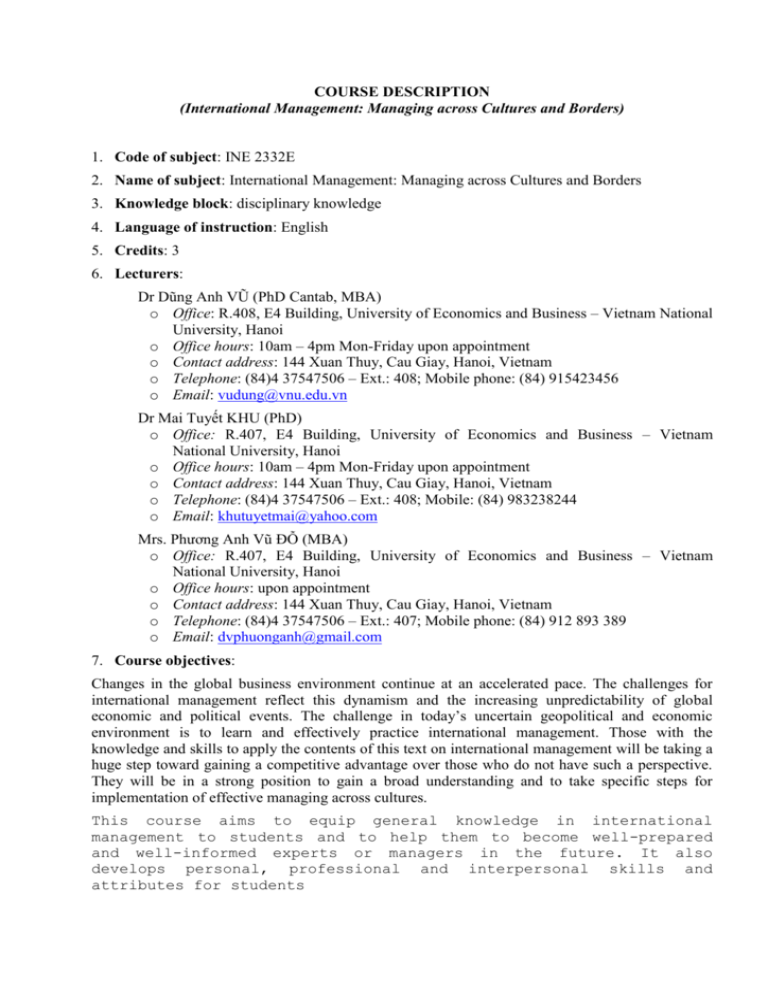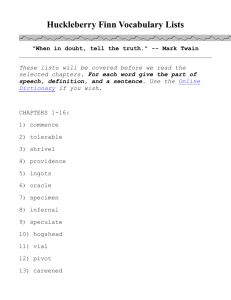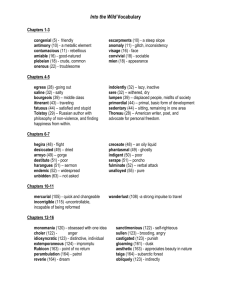
COURSE DESCRIPTION
(International Management: Managing across Cultures and Borders)
1. Code of subject: INE 2332E
2. Name of subject: International Management: Managing across Cultures and Borders
3. Knowledge block: disciplinary knowledge
4. Language of instruction: English
5. Credits: 3
6. Lecturers:
Dr Dũng Anh VŨ (PhD Cantab, MBA)
o Office: R.408, E4 Building, University of Economics and Business – Vietnam National
University, Hanoi
o Office hours: 10am – 4pm Mon-Friday upon appointment
o Contact address: 144 Xuan Thuy, Cau Giay, Hanoi, Vietnam
o Telephone: (84)4 37547506 – Ext.: 408; Mobile phone: (84) 915423456
o Email: vudung@vnu.edu.vn
Dr Mai Tuyết KHU (PhD)
o Office: R.407, E4 Building, University of Economics and Business – Vietnam
National University, Hanoi
o Office hours: 10am – 4pm Mon-Friday upon appointment
o Contact address: 144 Xuan Thuy, Cau Giay, Hanoi, Vietnam
o Telephone: (84)4 37547506 – Ext.: 408; Mobile: (84) 983238244
o Email: khutuyetmai@yahoo.com
Mrs. Phương Anh Vũ ĐỖ (MBA)
o Office: R.407, E4 Building, University of Economics and Business – Vietnam
National University, Hanoi
o Office hours: upon appointment
o Contact address: 144 Xuan Thuy, Cau Giay, Hanoi, Vietnam
o Telephone: (84)4 37547506 – Ext.: 407; Mobile phone: (84) 912 893 389
o Email: dvphuonganh@gmail.com
7. Course objectives:
Changes in the global business environment continue at an accelerated pace. The challenges for
international management reflect this dynamism and the increasing unpredictability of global
economic and political events. The challenge in today’s uncertain geopolitical and economic
environment is to learn and effectively practice international management. Those with the
knowledge and skills to apply the contents of this text on international management will be taking a
huge step toward gaining a competitive advantage over those who do not have such a perspective.
They will be in a strong position to gain a broad understanding and to take specific steps for
implementation of effective managing across cultures.
This course aims to equip general knowledge in international
management to students and to help them to become well-prepared
and well-informed experts or managers in the future. It also
develops personal, professional and interpersonal skills and
attributes for students
8. Teaching plan:
Teaching
Week
Methods
1
Course
Introduction
and Lecture
(2.5 hours)
Discussions
(0.5 hour)
Lecture
(2.5 hours)
2
Presentation
& Discussions
(0.5 hour)
Lecture
(5.5 hours)
3&4
Simulation
(In-class
exercise)
(0.5 hour)
Lecture
(2.5 hours)
5
Presentation
& Discussions
(0.5 hour)
Lecture
(3 hours)
6
Presentation
& Discussions
(0.5 hour)
Lecture
(2.5 hours)
7
Presentation
& Discussions
(0.5 hour)
Main contents
Course Introduction
Chapter 1: Globalization and
International Linkages
Introduction of Project 1
Case: Colgate’s Distasteful
Toothpaste
Review of Previous Chapters
Chapter 2: The Political, Legal,
and Technological Environment
Chapter 3: Ethics and Social
Responsibility
Summary
Case: Advertising or Free
Speech? The Case of Nike &
Human Rights
Homework related to the case:
Pharmaceutical Companies,
Intellectual Property, and the
Global AIDS Epidemic
Review of Previous Chapters
Chapter 4: The Meanings and
Dimensions of Culture
Summary
Case: Frankenfoods or Rice Bowl
for the World: The U.S.-E.U.
Dispute Over trade in Genetically
Modified Organisms
Review of Previous Chapters
Chapter 5: Managing Across
Cultures
Summary
Case: Coca-Cola in India
Review of Previous Chapters
Chapter 6: Organizational
Cultures and Diversity
Summary
Case(s): Euro Disneyland &
Beyond Tokyo: Disney's
Experiences in Asia
Review of Previous Chapters
Chapter 7: Cross-Cultural
Communication and Negotiation
Summary
Submission of Project 1
Case: Wal-Mart's Japan Strategy
Reading/Assignment
Instructor
Reading course syllabus
Reading Chapter 1 (pp.
2-35)
Homework
Read and answer the
questions in pp. 78-80
Dr.
D.A. VU
Reading Chapters 2-3
(pp. 36-77)
Homework
Dr.
D.A. VU
Read and answer the
questions in pp. 81-83
Read and answer the
questions in pp. 82-92
Reading Chapter 4 (pp.
94-125)
Homework
Dr.
M.T. KHU
Read and prepare your
role in pp. 557-563
Reading Chapter 5 (pp.
126-153)
Homework
Dr.
M.T. KHU
Read and answer the
questions in pp. 224-228
Reading Chapter 6 (pp.
154-183)
Homework
Dr.
M.T. KHU
Read and answer the
questions in pp. 229-240
Reading Chapter 7 (pp.
184-241)
Homework
Read and answer the
questions in pp. 241-248
Dr.
M.T. KHU
Lecture
(2.5 hours)
Review of Previous Chapters
Chapter 8: Strategy Formulation
and Implementation
Summary
Presentation
& Discussions
(0.5 hour)
Case: The HP-Compaq Merger
and Its Global Implications
Lecture
(2.5 hours)
Review of Previous Chapters
Chapter 9: Entry Strategies and
Organizational Structures
Summary
8
9
Presentation
& Discussions
(0.5 hour)
Lecture
(2.5 hours)
10
Self-study
(0.5 hour)
Lecture
(2.5 hours)
11
Presentation
& Discussions
(0.5 hour)
Lecture
(2.5 hours)
12
Presentation
& Discussions
(0.5 hour)
Lecture
(2.5 hours)
13
Presentation
& Discussions
(0.5 hour)
Review of Previous Chapters
Chapter 10: Managing Political
Risk, Government Relations, and
Alliances
Summary
Case: Microsoft Opens the Gates:
Patent, Piracy, and Political
Challenges in China
Homework related to the case
Review of Previous Chapters
Chapter 11: Management
Decision and Control
Summary
Case: Can the Budget Airline
Model Succeed in Asia? The
Story of AirAsia
Review of Previous Chapters
Chapter 12: Motivation Across
Cultures
Summary
Case: The road to hell
Review of Previous Chapters
Chapter 13: Leadership Across
Cultures
Summary
Case: Chiquita’s Global
Turnaround
Reading Chapter 8 (pp.
250-279)
Homework
Reading Chapter 9 (pp.
280-311)
Homework
Dr.
D.A. VU
Read and answer the
questions in pp. 372-376
Reading Chapter 10 (pp.
312-335)
Homework
Dr.
D.A. VU
Read and answer the
questions in pp. 368-371
Reading Chapter 11 (pp.
336-367)
Homework
Dr.
D.A. VU
Read and answer the
questions in pp. 384-390
Reading Chapter 12 (pp.
392-424)
Homework
Mrs. A.P.V.
DO
Read and answer the
questions in pp. 514-517
Reading Chapter 13 (pp.
425-465)
Homework
Mrs. A.P.V.
DO
Read and answer the
questions in pp. 530-538
Lecture
(2.5 hours)
In-Class
Reading
(0.5 hour)
Case: HSBC in China
Homework related to the case
Read and answer the
questions in pp. 518-529
Project 2 Presentation
Review Chapters 1-14
Project
Presentation
Dr.
D.A. VU
Read and answer the
questions in pp. 377-383
Review of Previous Chapters
Chapter 14: Human Resource
Selection and Development
Across Cultures
Summary
14
15
Case: The Last Rajah: Ratan Tata
and Tata's Global Expansion
Reading Chapter 14 (pp.
466-509)
Homework
Review Chapters 1-14
Mrs. A.P.V.
DO
All lecturers
9. Lecturing hours/week: 3 hours
10. Teaching activities:
The class will be conducted as an interactive exchange. Students will take an active role in leading
discussion of cases, presenting cases, and providing critical commentary. Each class will involve
discussion and dialogue as major elements in the learning strategy, although lecture will be utilized
to provide grounding for subject content. Individual participants will be responsible for completing
reading assignments and participating in discussion of those readings.
Students will be challenged to integrate knowledge they have gained from other business core
courses and apply their accumulated knowledge to business case studies. Students will engage in
active research and analytical problem solving related to managing in the international environment
and will frequently be called upon to brief their findings to the class.
11. Assessment: Assessment is made in the forms of attendance, in-class contribution and
discussions, Q&As, case preparation and presentation, course project, homework, final exam:
o Class attendance (5%).
o Homework (5%).
o Group case presentation (10%).
o In-class contribution (discussions, Q&As, chapter review, argument etc.) (5%).
o Project 1 (Individual) - Globalization Impact (10%).
o Project 2 (Group) - Foreign Entry Strategy (15%)
o Final exam (50%).
12. Required textbooks:
o Luthans, F. and Doh, J.P. International Management: Culture, Strategy, and
Behavior, 7th Ed., McGraw-Hill Irwin, 2009.
o Dresky, H. (2007), International Management: Managing Across Borders and
Cultures, 6th Ed., Pearson Prentice-Hall.
o Hill, Charles W.L., Global Business Today, 6th Ed., The McGraw-Hill, 2009.
13. Prerequisite courses: International Economics
DEAN
DEPARTMENT HEAD








